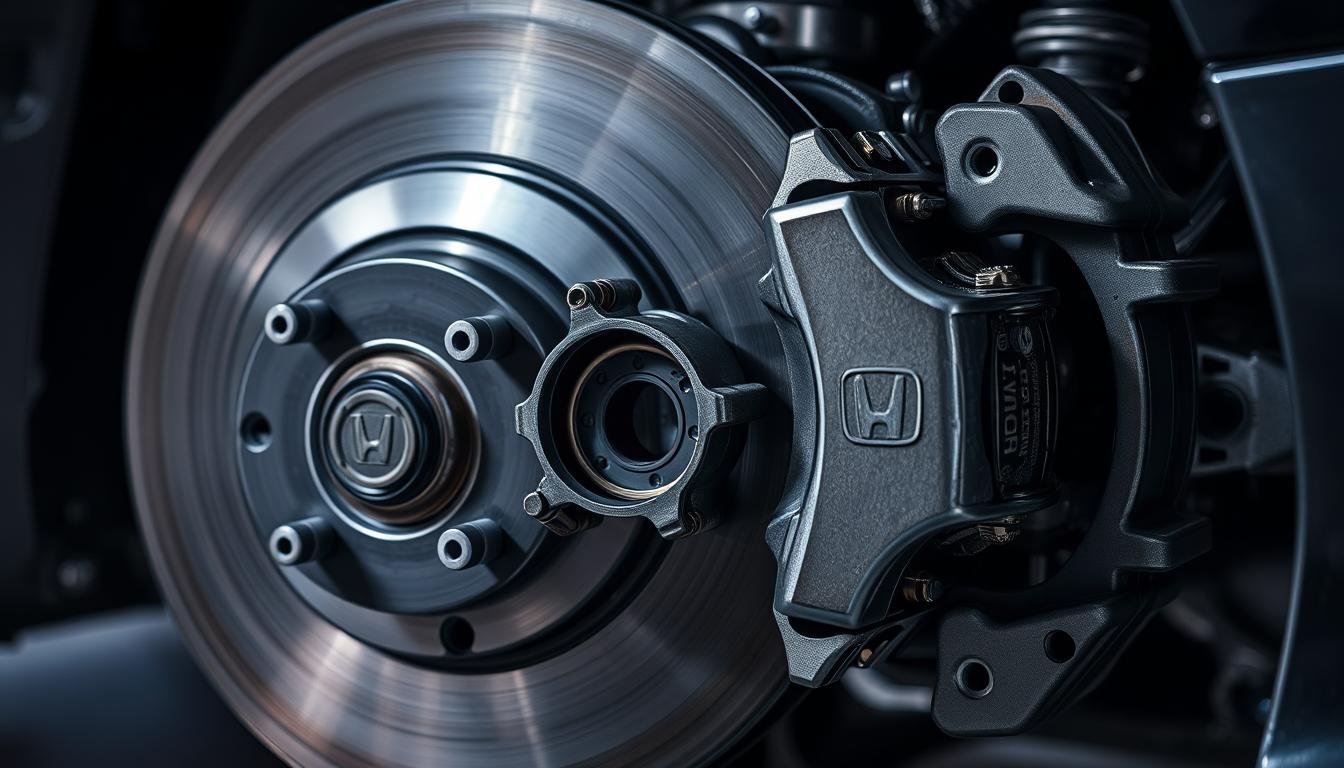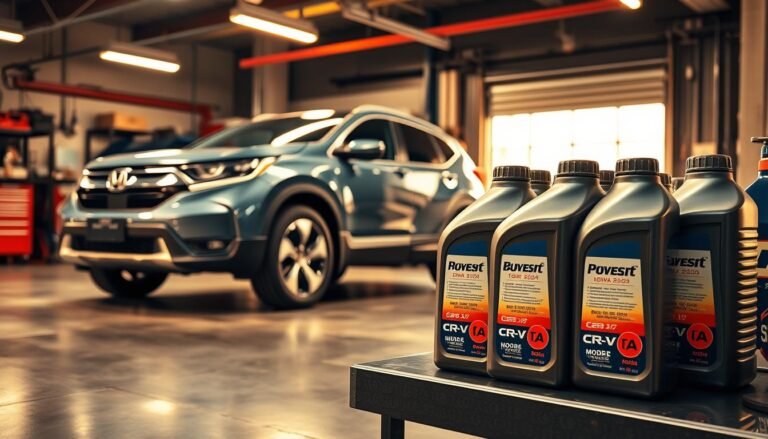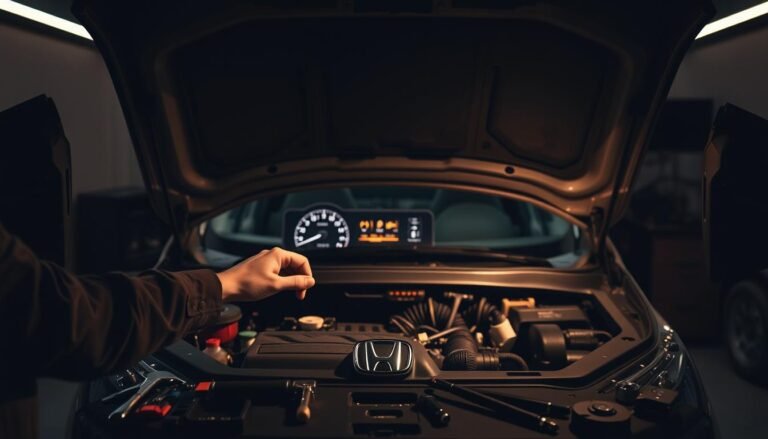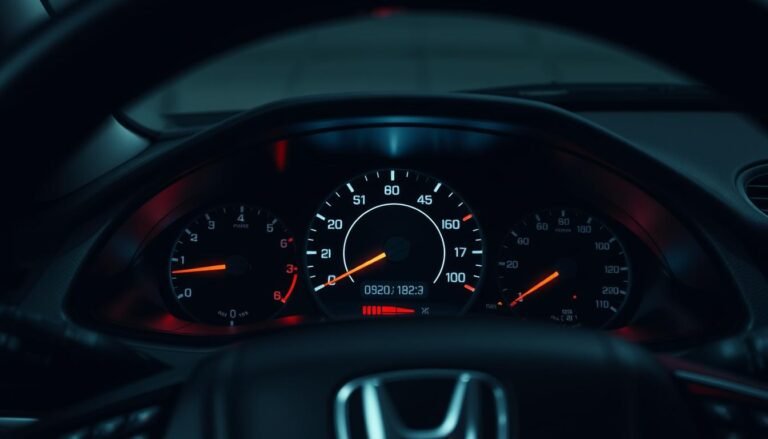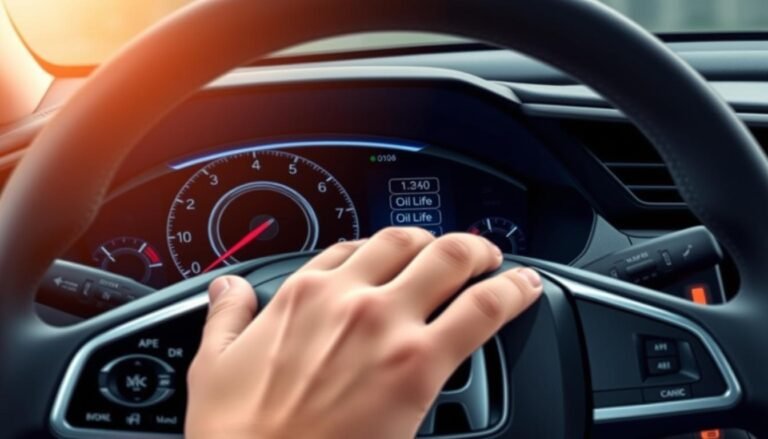Compromising Honda Civic Brake System Problem Issues
Are you facing Honda Civic brake system problems? It’s crucial to tackle these issues quickly for your safety and your car’s reliability.
Brake issues can lower performance and weaken your Civic’s braking power. This article will guide you in identifying common Honda Civic brake problems, understanding their causes, and exploring troubleshooting steps.
By following this advice, you can keep your Honda Civic’s brakes in top shape and prevent serious safety hazards.
Regular checks and changing brake pads on time are important to keep your car smooth.
If you hear strange noises or your brake pedal feels soft, it’s important to check it out right away.
Knowing what signs to look for helps you act correctly to take care of your car’s brakes. Let’s learn how to ensure your Honda Civic remains safe on the road!
What is The Importance of A Functional Brake System?
The importance of brake system is huge for your Honda Civic’s safety. It helps control your car’s speed and allows you to stop quickly when needed.
Without good brakes, you’re much more likely to get into an accident. Honda Civic brakes rely on several key parts: brake pads, calipers, rotors, and the master cylinder.
These parts work together to make sure you can brake effectively. It’s crucial to keep these components in good shape to avoid brake failure.
If you don’t take care of your brakes, it can be really bad. The costs for repair could go up, and driving could become dangerous.
So, every Honda Civic owner needs to know how important it is to have brakes that work well.
Signs of Honda Civic Brake System Problems
Knowing when there’s a problem with your brakes is key to keeping your Honda Civic safe and running well.
Look out for these signals that might mean there’s something wrong with your Honda Civic’s brakes:
- Unusual noises such as grinding or squeaking when applying brakes.
- A soft or spongy brake pedal that offers inadequate resistance.
- Vibrations or pulsations while braking can indicate underlying issues.
- A burning rubber smell can signal overheating components.
- Warning lights on your dashboard, particularly the “Check Brake System” alert, should not be ignored.
Don’t wait to deal with these issues. Ignoring them could lead to worse problems, like your brakes not working at all.
It’s important to always check on your brake system’s health to keep your Honda Civic safe and in good shape.
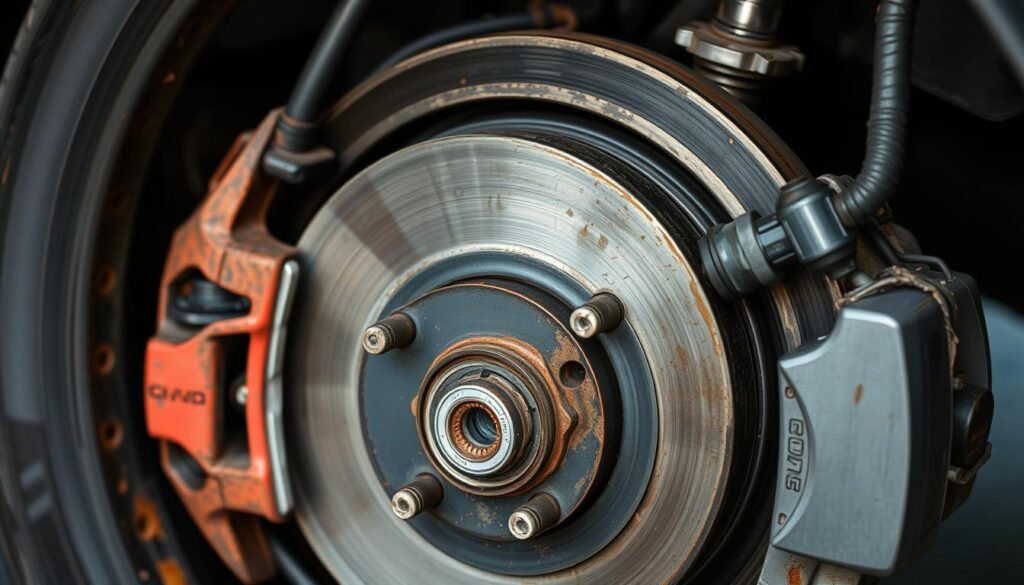
honda civic brake system problem
If you have a Honda Civic, pay close attention to the brakes. It’s crucial to spot common brake problems early.
Seeing the “Check Brake System” alert means something serious could be wrong. You should check it out right away.
Common Indicators You Shouldn’t Ignore
Look out for certain warning signs with your brakes. Here are key symptoms:
- Peeling tread on tires, suggesting uneven brake wear
- Loss of responsiveness when pressing the brake pedal
- Dashboard alerts, particularly the “Check Brake System” warning
These symptoms can come from different problems, like low brake fluid or old brake pads. Don’t ignore these signs. They could lead to risky situations while driving your Honda Civic.
Learning The “Check Brake System” Warning
The “Check Brake System” alert is very important. It could point to several brake issues. For instance:
- Low brake fluid levels
- Worn brake pads
- Faulty sensors within the anti-lock braking system (ABS)
You must check why this warning pops up right away. If you don’t, you’re risking brake failure. And that can make driving your car very dangerous.
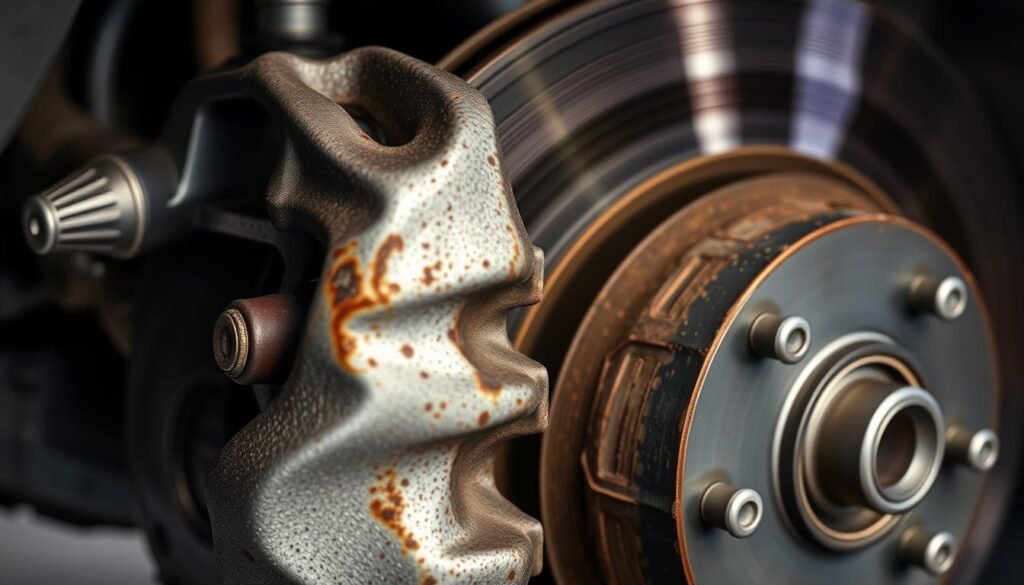
Potential Causes of Brake System Issues
Knowing honda civic brake problems helps in better car maintenance. Certain conditions can cause braking troubles, affecting safety and performance.
Here are the main reasons brake systems fail:
Low Brake Fluid Levels
Brake fluid levels can drop due to normal wear or unseen leaks. When this happens, your brakes won’t work as well.
It’s important to regularly check and keep the fluid at the right level.
Worn Brake Pads
Brake pads get worn out over time. When they’re too thin, you’ll hear a screeching sound when braking.
This noise tells you it’s time to replace the pads to avoid damage to the brake system.
Brake Fluid Leaks
Leakages in brake lines, calipers, or the master cylinder can be visible. These leaks reduce braking power, posing a danger to both you and others.
Faulty Brake Sensors
Brake sensors are key for checking system status. If they fail, they might give wrong information about your brake system’s health.
Master Cylinder Issues
The master cylinder plays a crucial role in the brake system. Failure can lead to a sinking brake pedal or low fluid pressure, causing severe braking issues.
Quick action is crucial for safety and keeping your car running smoothly.
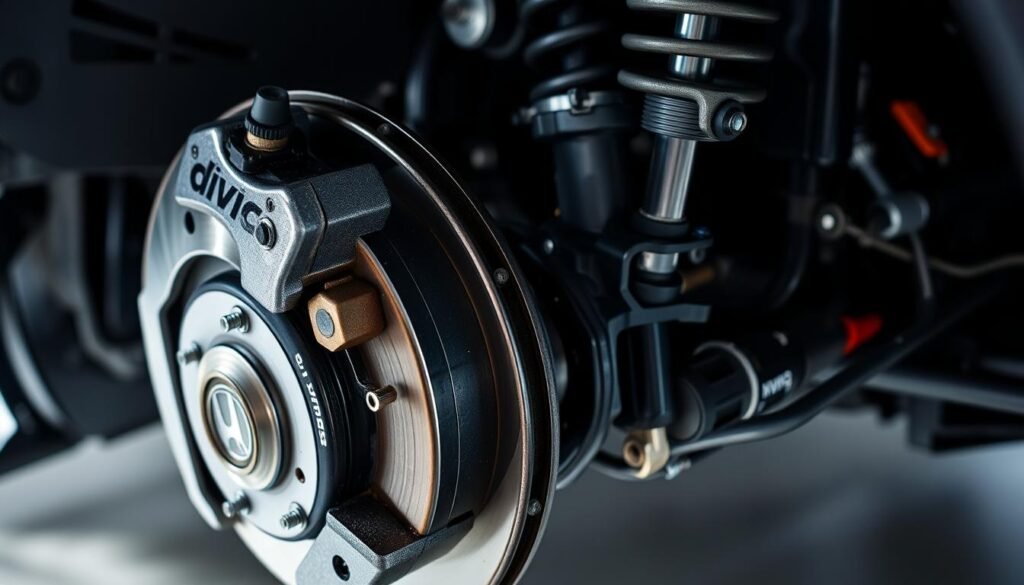
Diagnosing Your Honda Civic Brake Problems
To fix brake problems in your Honda Civic the right way, start with a simple plan. First, check the easy stuff and then move on to using high-tech tools for more details.
Initial Steps To Identify Brake System Issues
Begin by doing some basic checks:
- Make sure the brake fluid is full enough.
- Look for leaks in the brake system.
- Test how the brake pedal feels. If it’s soft, there might be an issue.
Using OBD II Diagnostic Tools
Next, use an OBD II scanner for deeper insights. This helps find the exact problems with the brakes. Here’s how:
- Plug the scanner into your Honda Civic’s port.
- Get any fault codes related to the brakes.
- Use a diagnostic program to figure out what the codes mean for your brakes.
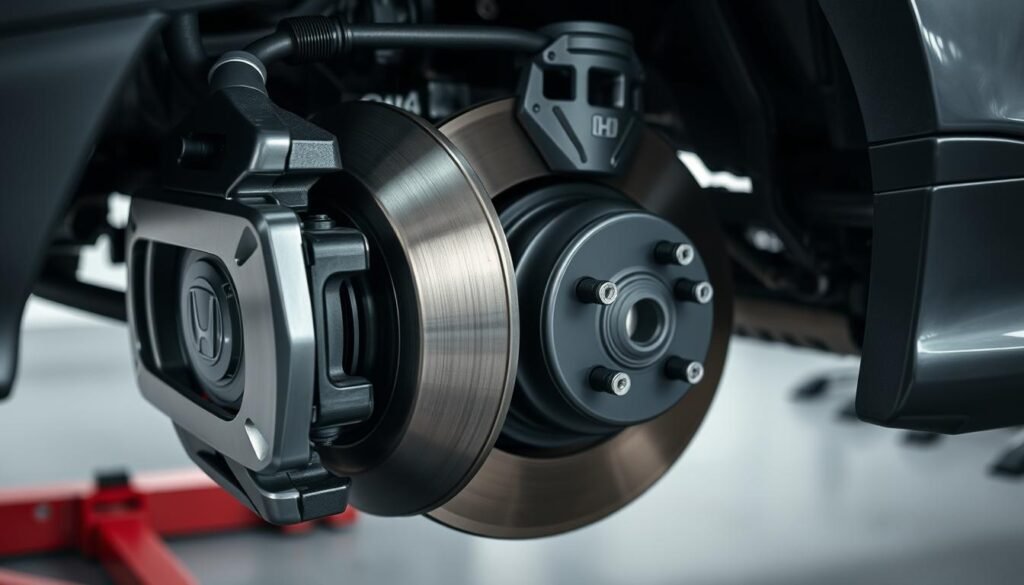
Troubleshooting Honda Civic Brake System Problems
When fixing your Honda Civic’s brakes, it’s important to be systematic. This ensures everything works safely and well. Here are some key steps to help you check things properly.
Checking Brake Fluid Levels
First, open the hood and find the brake fluid reservoir. It’s crucial to make sure the fluid level is right.
If it’s low, fill it up with the correct brake fluid. Also, look carefully for leaks that might have caused the level to drop.
Assessing Brake Pad Condition
Next, check how the brake pads are doing. You can do this by peeking through the wheel spokes.
If there’s less than 1/4 inch of pad left, you should replace them soon. Doing so keeps your braking strong and safe.
Inspections For Brake Fluid Leaks
Do a careful check of the whole brake system, especially the hoses and fittings. Be on the lookout for any signs of brake fluid leaks, like wet spots or dripping. Fixing leaks early stops more damage to the brakes.
Professional Honda Civic Brake Repair Options
If you’ve tried fixing brake issues yourself and it didn’t work, it’s time to see a mechanic. Knowing when to get professional help can keep you safe on the road.
Look for signs like warning lights, weird noises, or if brakes aren’t working right.
When To Consult A Mechanic
Here are signs you need an expert:
- Persistent warning lights on the dashboard
- Unusual noises during braking
- Brakes feel less responsive than normal
- Vibrations or pulsations during braking
Compromise Diagnostic Costs
Professional brake checks usually cost $50 to $100. This price includes looking at your brakes to find and fix any problems.
Paying for a check-up helps you understand what repairs are needed and prevents more damage. It’s a smart move for your Honda Civic’s brakes.
Common Repair Procedures
After seeing a mechanic, they might do a few standard fixes, such as:
- Replacing worn brake pads
- Flushing and replacing brake fluid
- Fixing or replacing faulty components like calipers or sensors
- Addressing electronic issues related to the ABS system
Preventative Maintenance For Your Honda Civic Brake System
Maintaining your Honda Civic’s brake system keeps you safe and enhances your car’s performance.
By sticking to a maintenance schedule, you can catch issues early. This also helps your brake parts last longer.
Regular Inspections
Check your brake system every 12,000 miles or at least yearly. This check-up should look at:
- Examination of brake pads for wear
- Assessment of rotor condition
- Verification of brake fluid levels
Brake Fluid Changes
Changing your brake fluid every 2 to 3 years is key. Moisture can get into the fluid over time, which decreases how well your brakes work. Regular fluid changes keep your brakes in top condition.
Timely Brake Pad Replacements
Change your brake pads when you’re told they’re worn down. Waiting too long can harm your rotors and lower how well your brakes work.
Keeping an eye on your brake pads ensures they work well.
Addressing Recalls Relating To Honda Civic Brake Systems
There are new updates about Honda Civic brake system recalls. These affect certain models made at specific times. The main issue is with the brake master cylinder seals.
If they fail, it could lead to brake failure. It’s crucial for Honda Civic owners to know about these recalls to keep their cars safe.
Recent Honda Brake Recalls Overview
The 2020-2021 Honda Civics made from October 2020 to May 2021 are impacted. If you own one of these, check its recall status soon. Your safety on the road depends on it.
The problem is with the brake master cylinder seal. This is serious, and fixing it is important to avoid danger.
How To Check If Your Honda Civic is Affected
To see if your Honda Civic is recalled, use your Vehicle Identification Number (VIN). Go to Honda’s official website or the NHTSA’s database for this.
Once you enter your VIN, you’ll find out if there are any recalls for your car. This helps you stay on top of things.
Replacing Your Honda Civic Brake Components
It’s vital to keep your Honda Civic’s brake system in top shape for safety. Choosing the right brake parts is key.
They must be reliable, long-lasting, and work well in any driving situation.
The Importance of Quality Parts
Use only OEM or top-notch aftermarket parts for brakes. High-quality parts mean less wear and more safety.
Good parts stop problems like brake fade and long stopping times, giving drivers comfort.
How Often Should Components Be Replaced?
Your car stays safe with regular maintenance. Brake pads need changing every 30,000 to 50,000 miles. Though rotors last longer, they must still be checked often for safety.
Keeping up with maintenance prevents big repair costs. It also makes your Honda Civic run better.
Conclusion
Learning the Honda Civic’s brake system is crucial for safety and perfect performance. If you catch and fix brake problems early, you’ll dodge risky situations.
Keeping your brakes in good shape keeps your Civic running smoothly, giving you comfort on the road.
By keeping an eye on your brakes and fixing problems quickly, your Civic will run better and avoid expensive repairs.
Remember, checking your brakes regularly and fixing any issues promptly is essential. This keeps your Honda Civic’s brake system in top condition.
Committing to taking care of your Civic’s brakes leads to a better driving experience.
With the right knowledge, you’ll make smart choices about maintaining your car. This ensures your vehicle is always safe and efficient for the years ahead.
FAQs
Q: What are common indicators of a Honda Civic brake system problem?
A: Look for unusual noises like grinding or squeaking, and a soft brake pedal. You might also notice vibrations or a burning smell while braking. Warning lights on the dashboard are another sign.
Q: How can I troubleshoot Honda Civic brake system issues?
A: First, check the brake fluid levels. Then, look at the brake pads’ condition and search for brake fluid leaks.
Q: What causes Honda Civic brake system issues?
A: Low brake fluid levels, worn brake pads, and brake fluid leaks are common causes. Faulty brake sensors and master cylinder issues can also cause problems.
Q: When should I consult a professional for Honda Civic brake repair?
A: Get professional help if warning lights stay on, you hear strange noises, or if the brakes don’t work well after you’ve tried to fix them.
Q: How often should I change the brake fluid in my Honda Civic?
A: Change the brake fluid every 2-3 years. This prevents moisture from harming your braking performance.
Q: What to do if my Honda Civic shows a “Check Brake System” warning?
A: Check the brake fluid levels and the brake pads for wear. Look over the braking system for faults. Fix any problems right away.
Q: How do I check if my Honda Civic is under a brake recall?
A: Use your Vehicle Identification Number (VIN) on Honda’s official website or the National Highway Traffic Safety Administration (NHTSA)’s database

